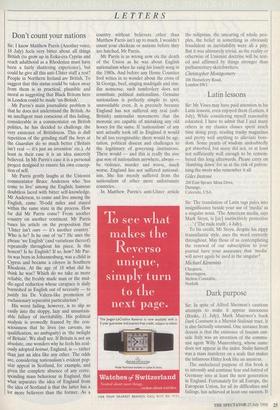LETTERS Don't count your nations
Sir: I know Matthew Parris (Another voice, 18 July) feels very bitter about all things British (to grow up in Eoka-era Cyprus and reach adulthood as a Rhodesian must have been a fairly shattering experience), but could he give all this anti-Ulster stuff a rest? People in Northern Ireland are British. To suggest that this status could be taken away from them is as practical, plausible and moral as suggesting that Black Britons here in London could be made `un-British'.
Mr Parris's main journalistic problem is that he does not understand the British. As an intelligent man conscious of this failing, considerable in a commentator on British politics, he has decided to challenge the very existence of Britishness. This is dull repetition of the grinding stuff the boys at the Guardian do so much better ('Britain isn't real — it's just an invention' etc.). At least in their case it is an idea sincerely believed. In Mr Parris's case it is a personal project designed to ensure his own concep- tion of self.
Mr Parris gently laughs at the Unionist commentator Bruce Anderson who 'has come to live' among the English; humour doubtless laced with bitter self-knowledge. Mr Anderson, to come and live among the English, came 70-odd miles and stayed Within the same state in the process. How far did Mr Parris come? From another country on another continent. Mr Parris bases his article on the proposition that 'Ulster isn't ours — it's another country.' Who is he? Is he one of 'us'? He uses the phrase 'we English' (and variations thereof) repeatedly throughout his piece. Is this honest? Is he English? If so, how? Mr Par- ris was born in Johannesburg, was a child in Cyprus and became a citoyen in Southern Rhodesia. At the age of 18 what did he think he was? Which do we take as more reliable, the freshly made man or the mid- dle-aged reduction whose carapace is daily burnished as English out of necessity — to justify his De Valera-like promotion of exclusionary separatist particularism?
His worst failing, however, is to slip so easily into the sloppy, lazy and unsustain- able fallacy of inevitability. His political analysis is avowedly framed by the con- sciousness that he lives (no caveats, no qualification, no ambiguity) in 'the twilight of Britain'. We shall see. If Britain is not an absolute, one wonders why he feels his zeal- ously adopted heimat, England, is — rather than just an idea like any other. The odds are, considering nationalism's evident pop- ular appeal in Scotland, for example, and given the complete absence of any corre- sponding mass behaviour in England, that What separates the idea of England from the idea of Scotland is that the latter has a lot more believers than the former. As a country without believers other than Matthew Parris isn't up to much, I wouldn't count your chickens or nations before they are hatched, Mr Parris.
Mr Parris is as wrong now on the death of the Union as he was about English nationalism when he sang his lonely song in the 1980s. And before any Home Counties fool writes in to wonder about the cross of St George, beef, singing madrigals and sim- ilar nonsense, such tomfoolery does not constitute political nationalism. Genuine nationalism is perfectly simple to spot, unavoidable even. It is precisely because England has not suffered any real (sub- British) nationalist movements that the moronic are capable of mistaking any old hooey for the same. If 'nationalism' of any sort actually took off in England it would be all too recognisable: there would be agi- tation, political dissent and challenges to the legitimacy of governing institutions. There would — and this is really the sine qua non of nationalism anywhere, always — be violence, murder and worse, much worse. England has not suffered national- ism. She has merely suffered from the nationalism of other more unfortunate countries.
In Matthew Parris's anti-Ulster article the solipsism, the smearing of whole peo- ples, the belief in something as obviously fraudulent as inevitability were all a pity. But it was ultimately trivial, as the reality or otherwise of Unionist doctrine will be test- ed and affirmed by things stronger than parliamentary sketchwriters.
Christopher Montgomety
106 Horseferry Road, London SW1


























































 Previous page
Previous page